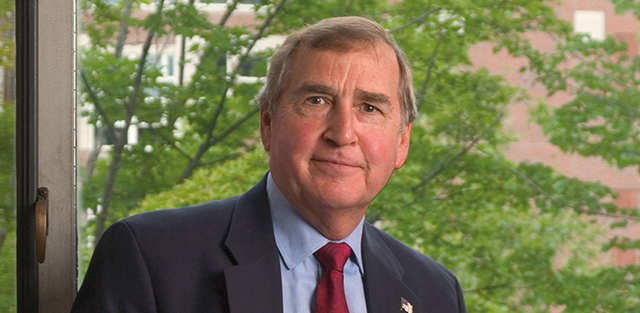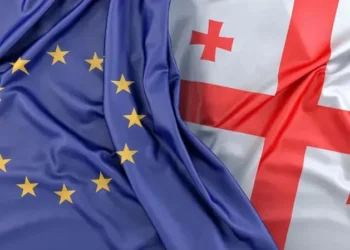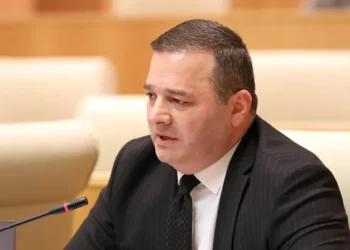Prof. Graham Allison, 82, is one the leading political scientists in the United States. A security and nuclear expert, he served as the dean of the John F. Kennedy School of Government and director of the Belfer Center for Science and International Affairs at Harvard University. As the planning chief at the Pentagon, he coordinated the US strategy toward the successor states of the Soviet Union after the end of the Cold War. Radio Free Europe’s Georgian Service sat down with him to discuss Ukraine and US-Russia relations now and moving forward.
You coined the term “Thucydides’ trap” to describe the Chinese-American relationship, when a rising power challenges the established one. Do you have an equally apt term for US-Russia relations, when a fallen power tries to re-establish itself and challenges the established one?
If we think of Japan, in 1941, it was rising, and the US responded in a way that actually strangled Japan, with conditions in which Japan felt itself threatened and insecure. It saw them lash out at Pearl Harbor. I think there’s at least a bit of an analogy there to what Putin felt he was facing as NATO became more visibly present in his total surround, including Ukraine, which he has some mystical attachment to, believing it part of Russia.
Earlier this month, the Crimean Bridge was blown up. Putin responded by bombing entire Ukraine. Where do we go from here?
If Putin is forced to choose between humiliating defeat or escalating the level of destruction, there’s every reason to believe he’ll choose the latter. As you step up the level of destruction, the first step is bombing infrastructure. That’s what he’s doing now, even though he doesn’t have as many smart bombs as he would like, so they are not as carefully targeted. One up that ladder of destruction is killing people. The Western narrative, and especially Zelensky’s, has asserted that Putin is killing a lot of civilians. Actually, he’s not been killing very many, if you think about it in historical terms. If he wanted to kill children, if he wanted to kill 1000s of people, he could bomb Kyiv, there’s nothing preventing him from sending bombers to bomb Kyiv, or from striking Kyiv with 100 missiles. In the first instance, he’s going after infrastructure, because he wants to freeze Ukraine. Right on up is killing people, then after that comes chemical weapons, and then after that comes nuclear strikes.
Ukraine doesn’t have a government that functions other than as a war government. They are going to have to try to build a government that can run a society and an economy, something that it was unable to do successfully before
It’s a very ugly picture. And even though a humiliating defeat for Russia, in Ukraine, would not, I believe, be existential for Russia, because Russia can survive without Ukraine, I think it will be existential for Putin. And, as President Biden said in private remarks which were made public last week, he thinks we’re stumbling along the path to that point for Putin.

If there is a targeted nuclear strike in Ukraine, what does it spell for Ukraine, Russia, the rest of the world?
It’s the question which President Biden and all of his national security team have been asking; a question that Europeans are asking, and they should be asking. We’ve had seven decades without the use of nuclear weapons in war. It’s remarkable. It’s an accomplishment. The nuclear taboo has emerged slowly, but it has emerged. And, fortunately, states have refrained from the use of nuclear weapons. But Putin certainly has the capability to conduct a nuclear strike. He would have reason, in his view, to conduct a nuclear strike, if he thought there was some chance that it would allow him to come out as a victor rather than a loser. Putin doesn’t think of himself as a loser and will be desperate to find some way out if he’s backed into a corner. If he should do this, we will be living in a new world. How the US and its Western allies will respond is not certain. A lot would depend on what is targeted by the nuclear weapon. He could use a “demonstration bomb,” just blow up something in the forest or in the Black Sea. He could hit a military target. He could hit a city. Last week, he said Truman dropping the bombs on Hiroshima and Nagasaki were his precedent. The bomb the Americans dropped on Hiroshima killed 140,000 people. So a nuclear strike on Kyiv with a tactical nuclear weapon, that could deliver the same blast. 15 kilotons, like the Hiroshima bomb, could kill quite a lot of people. What would the response be to that? I believe Washington has been working through a whole menu of options.
Is a nuclear response on that menu?
Washington would say everything is on the table. But a nuclear response seems to me to be highly unlikely, and I would say ill-considered, since the question would then be how Putin would respond in turn. You have bad options and worse options, no good options. And that’s why there’s such an intense effort now to persuade Putin that this is a really bad idea, including for him, for his country, for the world. He’s got to figure this out for himself, in terms of both what the US and the West would do in response, and also advice I’m hoping he’s getting from some of the people he trusts more, like China.
In an interview with Der Spiegel a few months ago, you said “we will have to end the war with the demon,” and the examples you brought were how Roosevelt and Churchill sat down with Stalin, and Nixon with Mao. How would that kind of ‘deal with the devil’ look when it comes to Putin?
If you read President Biden’s comments, they’re clearly thinking about off-ramps. That’s the way Washington thinks. My optimistic scenario would be that in the next month or two, one gets to a stalemate, probably somewhere along the current Line of Control, probably with Ukraine controlling most of what’s west of the of the Dnieper and the other river near Kherson, and Russia controlling most of the other side. The fighting declines to a low level, like what happened in 2016 – 2020 in the so-called independent republics of Donetsk and Lugansk. And at that stage, Putin thinks he has enough to declare that he’s been successful. He’s got his land bridge to Crimea, he’s taken in some additional territory. So he says he’s been successful. And we say we are successful, because we say Ukraine survived as a free and independent country, it’s not giving up any of its territory. It claims it’s going to recover those territories at some point, but not today. And Ukraine will focus on building a successful country, which will be extremely hard to do, but for which they have a moral claim on the West for major financial support. My good news story would be that this continues for a year or two or five. I remember the story of East and West Germany, West Germany never gave up its claim to East Germany, it just showed what a free society could do, relative to a Soviet-controlled autocracy, or North Korea and South Korea, or more relevant for Ukraine, the Baltics. Putin’s playbook in Ukraine looks to me taken directly from the communist playbook. In the Baltics, at the end of World War Two, they held sham referenda, they annexed Latvia, Lithuania and Estonia and called them Republics of the Soviet Union. The West did not recognize the Soviet Union’s claim to those territories, and, in time, they emerged as free states. That can take a long time, unfortunately, but since the alternative would be something even worse, I would regard that as an optimistic scenario.
Ukrainians can look north at Finland, and how they probably aren’t getting Karelia back. Or they can also look at South and North Korea, where, despite all the advancements of one, the other is still not willing to rejoin. How would the West sell that scenario to Ukraine?
Ultimately, it’ll be up to Zelensky and his colleagues to conclude they are at a point that this is to their maximum advantage. How they make that calculation will be substantially affected by what happens on the battlefield. If things grind to a stalemate, we’ll see. And if Putin is credible, in striking infrastructure and civilian targets, all still short of nuclear. And if this emerged as the prevailing view in Europe, which it is, though not for the Baltics, not for Poland.
I’m searching for a silver lining here. Because, generally, I think the more likely outcome is that we continue stumbling down this road to something that could be really quite catastrophic. If Putin conducted a nuclear strike, especially on a military target, in a way that had a meaningful impact, then there’s nothing preventing him doing a second or third, or fourth. He has 1900 tactical nuclear weapons. There’s enough to go around when he’s already guilty of striking and killing people with one, unless we find a way globally to respond, so he feels he made a mistake. But again, he’s not given to recognizing mistakes.
The impact of what Putin has done to Russia, its place in the world, its economy over the longer run, its status as a European country, is huge
That said, Putin is rational. And serious. But he entertains a number of ideas that are unrealistic, one of which is that Ukraine doesn’t exist as a country. We can now see there’s a very vigorous number of people who think of themselves as Ukrainians, and are prepared to fight for it. He’s been very surprised by that. Any serious person in the world will say, “you survived, you even stole a little territory, but at what price? This was a huge strategic blunder.” The impact of what he’s done to Russia, its place in the world, its economy over the longer run, its status as a European country, is huge. The strategic-thinking Russians, of whom there are many within the Putin regime, and anybody looking at this with clear eyes, would say, “if you’re calling this a ‘victory,’ you’d better hope you don’t have another ‘victory’.”
That moral claim you mentioned earlier, that Ukraine will have on the rest of the West, does it include their NATO bid?
I believe the answer is no. NATO has established a set of criteria for NATO membership that Ukraine hasn’t met, and won’t be able to meet for some years. And since NATO membership requires a unanimous vote among the NATO members, I think the likelihood the members would vote for it is very low. It is unrealistic at this point, partly because of the ongoing conflict, partly because they don’t have a government that functions other than as a war government. They are going to have to try to build a government that can run a society and an economy, something that Ukraine was unable to do successfully before. Before Putin got there, Ukraine was not doing very well. If you look at the numbers of all the former Soviet states that emerged after the disappearance of the Soviet Union, only one had per capita income less than it was when in the Soviet Union: Ukraine. They’ve had a lot of internal problems and they have a lot of work to do in building their country. But if they can be half as successful in building their country as they have been in defeating Putin’s attempt to erase Ukraine from the map, they’ll do pretty amazing stuff. I’m a believer. And I would say they certainly are.
We’ll see. With respect to the EU, there will be a faster track. And I think that one should be worked on. They’ll have powerful claims to have some equivalent of what is always called the Marshall Plan, very substantial financial assistance. Currently, they are financially a basket case, I think they get $5 or 6 billion a month, simply to pay the bills for the West. Unless the West comes forward with financial assistance, both for survival and for rebuilding the country, they don’t have much of a chance. We all have a stake in this.
Interview by Vazha Tavberidze














